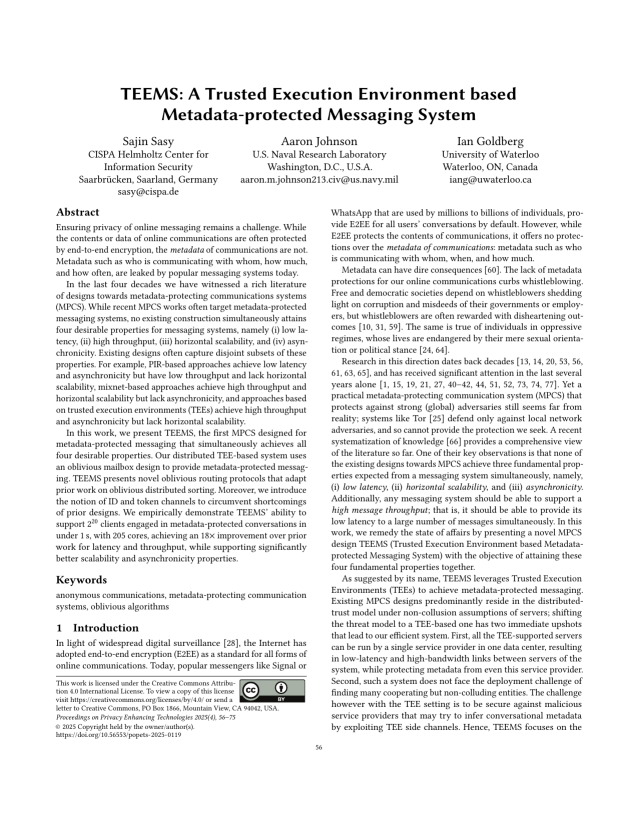TEEMS: A Trusted Execution Environment based Metadata-protected Messaging System
Authors: Sajin Sasy (CISPA Helmholtz Center for Information Security), Aaron Johnson (U.S. Naval Research Laboratory), Ian Goldberg (University of Waterloo)
Volume: 2025
Issue: 4
Pages: 56–75
DOI: https://doi.org/10.56553/popets-2025-0119
Artifact: Available, Functional, Reproduced
Abstract: Ensuring privacy of online messaging remains a challenge. While the contents or data of online communications are often protected by end-to-end encryption, the metadata of communications are not. Metadata such as who is communicating with whom, how much, and how often, are leaked by popular messaging systems today.
In the last four decades we have witnessed a rich literature of designs towards metadata-protecting communications systems (MPCS). While recent MPCS works often target metadata-protected messaging systems, no existing construction simultaneously attains four desirable properties for messaging systems, namely (i) low latency, (ii) high throughput, (iii) horizontal scalability, and (iv) asynchronicity. Existing designs often capture disjoint subsets of these properties. For example, PIR-based approaches achieve low latency and asynchronicity but have low throughput and lack horizontal scalability, mixnet-based approaches achieve high throughput and horizontal scalability but lack asynchronicity, and approaches based on trusted execution environments (TEEs) achieve high throughput and asynchronicity but lack horizontal scalability.
In this work, we present TEEMS, the first MPCS designed for metadata-protected messaging that simultaneously achieves all four desirable properties. Our distributed TEE-based system uses an oblivious mailbox design to provide metadata-protected messaging. TEEMS presents novel oblivious routing protocols that adapt prior work on oblivious distributed sorting. Moreover, we introduce the notion of ID and token channels to circumvent shortcomings of prior designs. We empirically demonstrate TEEMS' ability to support 2^20 clients engaged in metadata-protected conversations in under 1 s, with 205 cores, achieving an 18× improvement over prior work for latency and throughput, while supporting significantly better scalability and asynchronicity properties.
Keywords: anonymous communications, metadata-protecting communication systems, oblivious algorithms
Copyright in PoPETs articles are held by their authors. This article is published under a Creative Commons Attribution 4.0 license.

